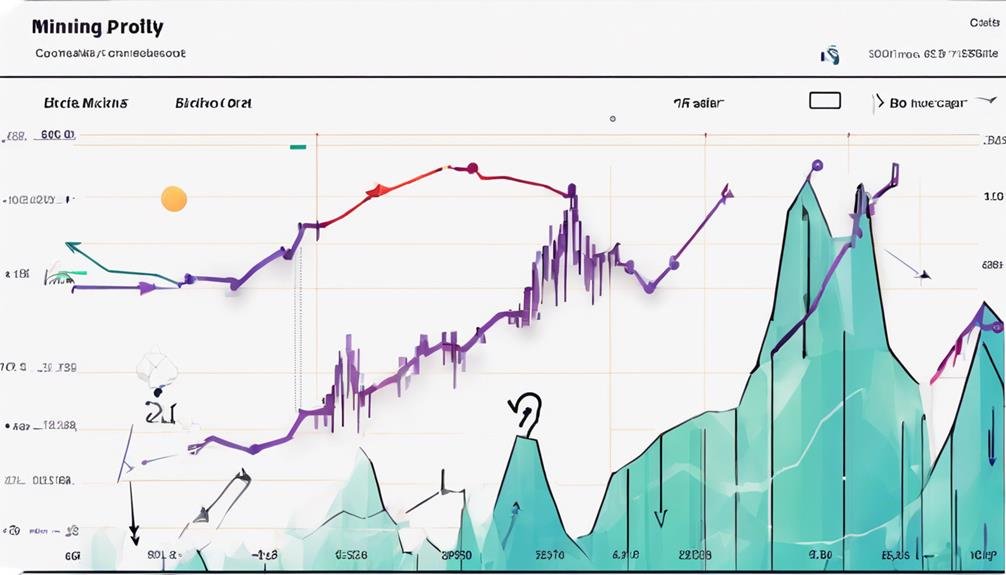As a miner in 2024, you might be wondering how to navigate the complexities of Bitcoin mining profitability amidst changing landscapes. Understanding the nuances of factors like energy costs, technological advancements, regulatory environments, price trends, and sustainability practices can profoundly impact your success.
By exploring the seven key insights into 2024 Bitcoin mining profitability, you can gain valuable knowledge to enhance your strategies and potential competitive edge in the ever-evolving world of cryptocurrency mining.
Table of Contents
Key Takeaways on Bitcoin Mining Profitability
- Energy-efficient technologies are crucial for maximizing profitability.
- Renewable energy sources like hydroelectric power can reduce costs.
- Regulatory changes impact mining profitability and industry sustainability.
- Technological advancements in ASICs and cooling systems enhance mining efficiency.
Current State of Bitcoin Mining

In the current landscape of Bitcoin mining, costs per bitcoin range from $10,000 to $15,000, indicating the significant financial investment required to produce a single cryptocurrency unit. With projections from JPMorgan suggesting a potential doubling of these costs to $40,000 post-halving, the industry is bracing for a seismic shift. As energy consumption remains a key factor in mining profitability, miners increasingly focus on operational efficiency and strategic planning to navigate this impending change.
Given these circumstances, the emphasis shifts from simply maximizing hashrate to ensuring sustainable operations that weather the upcoming cost surge. The post-halving scenario is expected to favor only the most cost-efficient miners, emphasizing the critical role of energy costs and equipment efficiency in determining the viability of mining operations. As the industry evolves, adaptability and optimization will be paramount for miners looking to thrive in the increasingly competitive Bitcoin mining landscape.
Impact of Energy Costs

Energy costs play a pivotal role in shaping the profitability landscape of Bitcoin mining operations, with expenses in this domain often comprising a substantial portion of the overall operational budget. When considering the impact of energy costs on Bitcoin mining profitability, several key insights emerge:
- High Proportion of Operational Expenses: Energy costs can represent a significant portion, ranging from 70% to 80%, of the total operational expenses incurred in Bitcoin mining activities.
- Comparison to Small Countries: The energy consumption associated with the Bitcoin network is substantial, comparable to that of some small countries. This underscores the importance of managing energy costs efficiently.
- Shift towards Renewable Energy: To mitigate the environmental impact of Bitcoin mining, the industry is increasingly exploring renewable energy sources such as hydroelectric and solar power. This shift not only aligns with sustainability goals but also offers the potential for cost savings in the long term.
Technological Advancements in Mining

Considering the important role of energy costs in Bitcoin mining profitability, the evolution of technological advancements in mining hardware and software stands out as a pivotal factor shaping the industry landscape.
The development of more efficient ASICs by companies like Bitmain, MicroBT, and Canaan has greatly boosted hashing power, enhancing overall mining performance and energy efficiency. Additionally, adopting liquid immersion cooling systems has emerged as a game-changer in the industry, allowing for improved heat dissipation and increased hardware longevity.
Additionally, the increasing utilization of renewable energy sources such as hydroelectric power and solar energy is playing a key role in mitigating the environmental impact of mining operations. These advancements, coupled with ongoing progress in mining software and algorithms for hash rate optimization, are driving increased mining efficiency and lowering operational costs.
The industry’s focus on innovation and sustainability through technologies like ASICs, liquid cooling, and renewable energy sources is reshaping the future of Bitcoin mining.
Regulatory Environment for Miners

Amidst the global landscape of Bitcoin mining, the regulatory environments governing miners worldwide exhibit a diverse range of approaches, impacting the industry’s operational dynamics considerably.
- Some countries embrace Bitcoin mining, while others impose restrictions, creating a varied regulatory environment.
- China’s crackdown on mining operations caused a significant shift in the global mining landscape, influencing miners worldwide.
- Countries like the United States, Kazakhstan, and Russia are emerging as key players in the Bitcoin mining industry due to their favorable regulations.
Regulatory clarity and government support are vital in attracting mining investments and fostering industry growth. Compliance with local regulations is essential for miners to operate legally and sustainably in different jurisdictions.
Understanding the regulatory environment in various countries is imperative for miners to navigate challenges and capitalize on opportunities within the evolving Bitcoin mining sector.
Forecasting Bitcoin Price Trends

Analyzing past Bitcoin price trends provides valuable insights into potential future movements in the cryptocurrency market. The highly volatile nature of Bitcoin price trends, with significant historical fluctuations, necessitates a data-driven approach to forecasting.
Analysts anticipate a potential price rally post-halving, an important factor that could impact mining profitability. Market demand, investor sentiment, and macroeconomic conditions all play pivotal roles in influencing Bitcoin’s price movements. To forecast Bitcoin price trends accurately, traders employ technical analysis tools and market indicators to interpret market behavior.
Understanding historical price patterns and market cycles is essential for making informed predictions about future Bitcoin price movements. By staying abreast of these key factors and conducting thorough analysis, you can effectively enhance your ability to forecast Bitcoin price trends, thereby optimizing your mining profitability in the dynamic cryptocurrency market.
Strategies for Maximizing Profitability
To maximize profitability in Bitcoin mining, strategically implementing energy-efficient practices and diversifying operations across different locations are key tactics. By reducing the cost of mining and optimizing operational efficiency, miners can enhance their bottom line. Consider the following strategies:
- Utilize energy-saving practices: Implementing energy-saving solutions can reduce electricity costs, typically representing a substantial portion of mining expenses.
- Diversify mining operations: Spreading mining operations across various locations can help hedge against regulatory changes, natural disasters, or other risks that could impact profitability.
- Invest in renewable energy: Shifting to renewable energy sources, such as solar or wind power, can not only reduce the environmental impact of mining but also lower energy costs over the long term, contributing to enhanced profitability.
Sustainability Practices in Mining

In today’s rapidly evolving mining landscape, integrating sustainable practices is becoming increasingly pivotal for the long-term success and environmental responsibility of Bitcoin mining operations. Sustainable mining practices focus on reducing the environmental impact of mining activities.
Companies are actively exploring using renewable energy sources, such as solar and wind power, to fuel their operations, aiming to decrease carbon emissions. Additionally, the development of energy-efficient hardware designs is underway to minimize electricity consumption within mining facilities. These initiatives promote responsible energy usage and contribute to the mining industry’s overall sustainability .enting.
These sustainable practices are essential for ensuring the long-term viability and acceptance of Bitcoin mining in the global economy. By embracing renewable energy sources and energy-efficient hardware, mining operations can greatly reduce their carbon footprint, aligning with the growing industry’s need for environmentally conscious practices.
Frequently Asked Questions
Is It Still Profitable to Mine Bitcoin in 2024?
Yes, mining Bitcoin in 2024 can still be profitable if you manage electricity costs efficiently, optimize hardware efficiency, and navigate market volatility. Adapting to changing dynamics and implementing sustainable practices is essential for profitability.
What Determines Bitcoin Mining Profitability?
To determine Bitcoin mining profitability, consider electricity costs, mining difficulty, and hardware efficiency. Efficient operations, low costs, and optimized hardware are crucial. Mining rewards, impacted by price fluctuations and halving events, influence profitability.
What Is the Most Profitable Bitcoin Miner?
As of now, one of the most profitable Bitcoin miners is the Bitmain Antminer S19 Pro, which has a hash rate of around 110 TH/s and power consumption of 3250W. However, the profitability of Bitcoin mining depends on various factors such as electricity costs, mining difficulty, and Bitcoin price fluctuations. It’s important to do your own research and consider these factors before investing in a Bitcoin miner.
What Are Bitcoin Miners Trying to Guess?
Bitcoin miners are trying to guess a specific number known as the “nonce.” The nonce is a random number that, when combined with the other data in a block, generates a hash that meets a certain criteria set by the Bitcoin network. Miners compete to find the correct nonce that results in a hash that starts with a certain number of zeros. This process is known as proof of work and is essential for adding new blocks to the blockchain and securing the network.
Conclusion
To sum up, are you ready to adapt and thrive in the ever-changing landscape of Bitcoin mining profitability in 2024? By leveraging efficiency, embracing technological advancements, and staying ahead of regulatory challenges, miners can maximize their profits and guarantee sustainability.
With strategic planning and a focus on sustainability practices, success in the post-halving era is within reach. Are you prepared to seize the opportunities that lie ahead in the world of Bitcoin mining?



